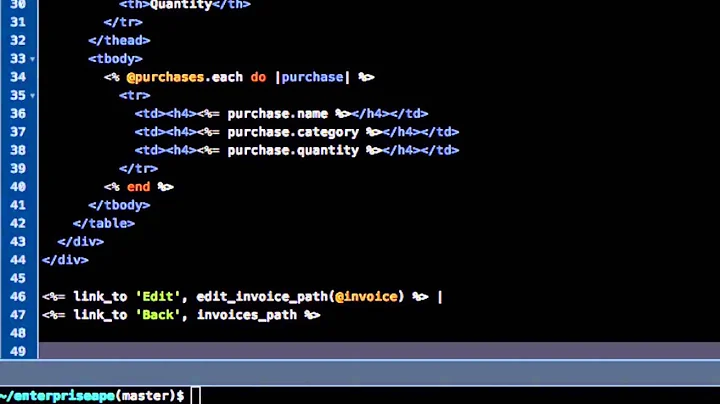Rails find_or_create_by more than one attribute?
Solution 1
Multiple attributes can be connected with an and:
GroupMember.find_or_create_by_member_id_and_group_id(4, 7)
(use find_or_initialize_by if you don't want to save the record right away)
Edit: The above method is deprecated in Rails 4. The new way to do it will be:
GroupMember.where(:member_id => 4, :group_id => 7).first_or_create
and
GroupMember.where(:member_id => 4, :group_id => 7).first_or_initialize
Edit 2: Not all of these were factored out of rails just the attribute specific ones.
https://github.com/rails/rails/blob/4-2-stable/guides/source/active_record_querying.md
Example
GroupMember.find_or_create_by_member_id_and_group_id(4, 7)
became
GroupMember.find_or_create_by(member_id: 4, group_id: 7)
Solution 2
In Rails 4 you could do:
GroupMember.find_or_create_by(member_id: 4, group_id: 7)
And use where is different:
GroupMember.where(member_id: 4, group_id: 7).first_or_create
This will call create on GroupMember.where(member_id: 4, group_id: 7):
GroupMember.where(member_id: 4, group_id: 7).create
On the contrary, the find_or_create_by(member_id: 4, group_id: 7) will call create on GroupMember:
GroupMember.create(member_id: 4, group_id: 7)
Please see this relevant commit on rails/rails.
Solution 3
For anyone else who stumbles across this thread but needs to find or create an object with attributes that might change depending on the circumstances, add the following method to your model:
# Return the first object which matches the attributes hash
# - or -
# Create new object with the given attributes
#
def self.find_or_create(attributes)
Model.where(attributes).first || Model.create(attributes)
end
Optimization tip: regardless of which solution you choose, consider adding indexes for the attributes you are querying most frequently.
Solution 4
By passing a block to find_or_create, you can pass additional parameters that will be added to the object if it is created new. This is useful if you are validating the presence of a field that you aren't searching by.
Assuming:
class GroupMember < ActiveRecord::Base
validates_presence_of :name
end
then
GroupMember.where(:member_id => 4, :group_id => 7).first_or_create { |gm| gm.name = "John Doe" }
will create a new GroupMember with the name "John Doe" if it doesn't find one with member_id 4 and group_id 7
Solution 5
You can do:
User.find_or_create_by(first_name: 'Penélope', last_name: 'Lopez')
User.where(first_name: 'Penélope', last_name: 'Lopez').first_or_create
Or to just initialize:
User.find_or_initialize_by(first_name: 'Penélope', last_name: 'Lopez')
User.where(first_name: 'Penélope', last_name: 'Lopez').first_or_initialize
Related videos on Youtube
tybro0103
Coffee junkie, computer nerd, fitness monster, and father of two cool dudes.
Updated on June 05, 2020Comments
-
 tybro0103 almost 4 years
tybro0103 almost 4 yearsThere is a handy dynamic attribute in active-record called find_or_create_by:
Model.find_or_create_by_<attribute>(:<attribute> => "")But what if I need to find_or_create by more than one attribute?
Say I have a model to handle a M:M relationship between Group and Member called GroupMember. I could have many instances where member_id = 4, but I don't ever want more than once instance where member_id = 4 and group_id = 7. I'm trying to figure out if it's possible to do something like this:
GroupMember.find_or_create(:member_id => 4, :group_id => 7)I realize there may be better ways to handle this, but I like the convenience of the idea of find_or_create.
-
x1a4 almost 12 yearsOne thing to note is that this won't handle attributes that cannot be mass-assigned, while
find_or_create_bywill. -
hiroshi over 11 yearsMarco, try
Model.where(attributes).instance_eval{|q| q.first || q.create}. -
Seamus Abshere almost 11 yearsYou might also like github.com/seamusabshere/upsert - the first argument is a hash of attributes that is used to find or create a record
-
 mrm almost 11 years
mrm almost 11 yearsfind_or_createalso has the benefit of using a transaction, wherewhere….first || createintroduces a race condition -
Augustin Riedinger almost 11 yearsI would say
def self.find_or_create(attributes) self.where(attributes).first || self.create(attributes) endso that you don't need to repeatModel -
Sumit Bisht almost 11 yearsIt is helpful to note that initialize calls the create() instead of new() that might be called in case of first_or_create
-
David Tuite almost 10 years@AugustinRiedinger You don't need
selfinside the method body either (since you're looking to remove words!). -
 6ft Dan almost 10 yearsCan some one share a gist example of this usage? I'm not familiar with its placement and calling.
6ft Dan almost 10 yearsCan some one share a gist example of this usage? I'm not familiar with its placement and calling. -
antinome over 9 years@mm - Using a transaction here does not prevent a race condition, unless you have configured a higher-than-normal (and less performant) isolation level on your RDBMS. Note that api.rubyonrails.org/classes/ActiveRecord/… specifically mentions that find_or_create_by is vulnerable to a race condition.
-
Kyle Heironimus over 9 yearsI reverted the removal of Rails 3 code, since lots of people are not using Rails 4 yet.
-
CodeExpress over 9 yearsJust to add: find_or_create_by_*() functions have been deprecated in Rails 4, however find_or_create_by() is NOT. It is okay to use find_or_create_by(). Check the commit where this was added github.com/rails/rails/commit/… and the official Rails 4.2 documentation for the usage: guides.rubyonrails.org/v4.2.0/…
-
 AllenC over 8 yearsDoes the
AllenC over 8 yearsDoes thefind_or_create_byis really deprecated in Rails 4? I just found a resource apidock.com/rails/v4.2.1/ActiveRecord/Relation/… under version of Rails 4.2.1 -
Duke about 8 years




![Rails - Nested Forms in Rails | [Tutorial]](https://i.ytimg.com/vi/niLRlaL-ss0/hq720.jpg?sqp=-oaymwEcCNAFEJQDSFXyq4qpAw4IARUAAIhCGAFwAcABBg==&rs=AOn4CLByVUa2ekD1OKDHfcUyYxAzLAHAiQ)


